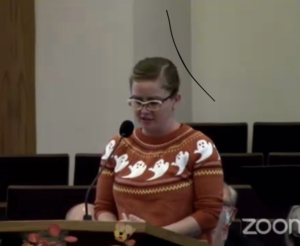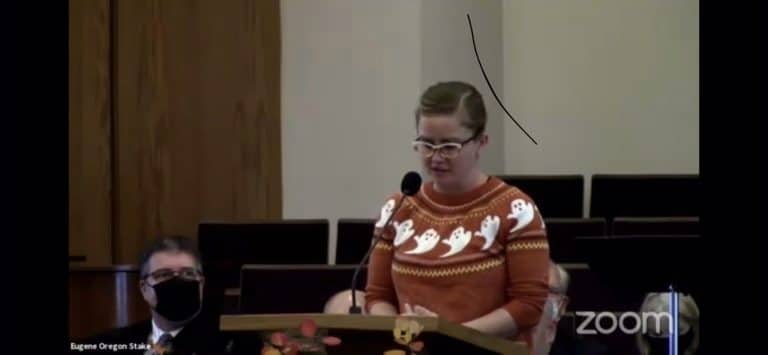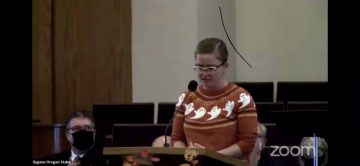I was asked to speak in Stake Conference on the topic “Staying on/Returning to the Covenant Path.” This was my talk. (Note: The meeting was on Halloween, hence the sweater. At least I can be confident I brought the Spirit with me).
 For the first quarter century of my life, staying on the covenant path was not particularly tricky. I got baptized right on time, finished my Young Women’s medallions, took out my endowment, went on a mission and was sealed in the Temple at 25. Done and done. I liked going to the Temple and went as often as I could.
For the first quarter century of my life, staying on the covenant path was not particularly tricky. I got baptized right on time, finished my Young Women’s medallions, took out my endowment, went on a mission and was sealed in the Temple at 25. Done and done. I liked going to the Temple and went as often as I could.
And then, almost without me really noticing it happening, something changed. I first started noticing the real gender disparities within the Church when I served a mission. I had naively thought that the way I felt secondary in the YSA ward was because I hadn’t served a mission and wasn’t as wise as all those mature 22 year old young men who knew the scriptures so well. I thought that being a missionary would automatically put me on equal footing. I remember in the MTC our teacher presenting an investigator’s concern from her missionary days, and asking us to resolve it. My district leader said “maybe she just needs to hear the Gospel from a man.” I will tell you right now that my urge to slap him was so strong I had to leave the room, sit on my hand, and cry until the fury subsided. It was not an isolated incident.
After my mission I started a graduate program in history. I focused on gender theory and Modern France. I started to see the world in an entirely different way, noticing things that I had never noticed before, and that could not be unseen once I did. It grated, and grated, and grated on me. When I brought up my concerns mostly people said “I guess I never noticed that” and it seemed like I was the only person in the Church who had ever been bothered by those things. But I wasn’t. The internet was full of people who understood exactly how I felt and exactly what I was thinking. For awhile that made me feel better – less alone, less crazy.
But then it started to make me feel worse. I wasn’t trying to find new flaws in the Church. I wasn’t looking to feel angrier, I just wanted to feel seen and validated in my own struggles. But increasingly the blogs and chats that I frequented were places where no one was staying in the Church. They were full of rants about people in other wards and other states – they made me furious, but over what? People I would never meet and who had no authority over me. Reading started to make me feel worse. But Church still wasn’t making me feel any better.
I didn’t know what to do. As a Young Woman I had been taught the value of integrity. On one hand, I knew the testimony I had received and I felt that I could not deny it and retain my integrity. On the other hand, I didn’t feel like I could just pretend my concerns away as if they didn’t exist. I care about gender equality, and racial equality, and the rights of LGBTQ people. So how could I stay in an organization like the Church? But I also love the Savior and feel this is the place to be, so how could I leave? This kind of cognitive dissonance – trying to believe two mutually exclusive things to be true — is really painful, and our brains don’t like it. We yearn for resolution, and I know that many of my friends were only able to feel peace again by walking away.
The answer I received is not one that I am promoting to everyone. I feel that it was the answer God gave to me. If you find yourself in a similar miserable quandary, then I suggest you seek your own answer of if and how you can stay. My answer was this: The Church is true in the Eugene Fifth Ward. Hold on to the pieces that allow you to stay. Distance yourself from anything that is making it hard to want to stay.
So I did. I stopped reading the blogs I was reading, and I left the social media groups I had frequented. I also unsubscribed from Church magazines, I stopped watching General Conference, I didn’t read anything that came from the Church News Room and I didn’t visit any Church websites. I stopped attending the Temple, because that had become excruciatingly painful. Most of my pain and conflict was coming from policies, not doctrine. The doctrines were all right there in the scriptures in my house. The application of doctrine was right before me in my home and neighborhood. If the corporate aspect of the Church was too hard to take, then avoid it as much as possible. Do what you have to do to stay.
As I said, I am not advocating for this as some universal policy. I’m telling you what worked for me. And I think there is a sound doctrinal reason for that answer, despite how unorthodox it sounds. Humans are temporal creatures. Our only time and place to act is here and now. The scriptures warn against looking beyond the mark, lest we stumble. I think we’re tempted to place our obedience to commandments in the land of make-believe without ever realizing it. We speak of being willing to live the law of Consecration as practiced by the pioneers, but that is some hypothetical future willingness, not a here-and-now sacrifice. As a teenager I was constantly taught to plan now what I would do in hypothetical tempting situations, so I would be prepared. And I did. But I was never offered any alcohol or drugs, because I was not cool, and was not invited to parties. I never had a boyfriend – all the Mormon boys at my high school were either three years older or two years younger, and in any case I was much more interested in romantic book heroes than real human guys. I was drawing pictures of princesses and watching musicals with my best friend right on through graduation. All that hypothetical obedience to the Word of Wisdom or the Law of Chastity turned out to be rather less important that the challenges that were right in front of me.
The Church offers us so many supports and programs and resources. But the application of the covenants we’ve made isn’t in Salt Lake, or in an online training, or in a magazine. It’s in our wards, in our ministering assignments, in our families. We’ve been called to mourn with those who mourn. The mourners are all around you – these last two years have been marked by trauma and grief and loss for all of us. There isn’t a single person in your ward who is not in need of comfort. Not one. The place to stand as a witness of God is in your class, in your neighborhood. Standing as a witness means being the hands that reach out to hug, to bring a meal, to type a thoughtful text. Standing as a witness means being Christ’s listening ears. Of course God hears your prayers. But it is nice to hear “That sounds so hard. I love you. Tell me more.” From an actual audible voice when you pour your heart out.
I don’t know that I’m a shining example of staying on the Covenant path. I have resubscribed to Church magazines in the last year, though I’m not sure I’ve read a single issue. But they’re in the house again. I now listen to maybe 75% of General Conference, but I give myself permission to turn off anything that is making me angry. This is my first time attending Stake Conference in a good five years. I haven’t been to the temple in 7 years. I could, I think. It isn’t a question of worthiness, or lack of testimony. I’m just not sure I want to. But also – I think I’m still honoring my covenants. I’m striving to obey the commandments. I work really hard at serving in my calling, and at loving the people in my ward. I’m trying to teach my children to love God and to be kind and loving and to see people who need caring hands to lift them up.
I think it’s better to just try to be on whatever version of the path you can handle, than to leave the path altogether. I think the things that are wrong are the works of man, and not God. And that means they can change, and they have changed in the years since I started noticing. They’re still changing. And I think they’re changing because people like me decided to stay, and to keep squeaking the wheel and speaking up and sending letters and crusading against every ill. It’s exhausting and discouraging. But I think I made the right choice. I’m still making that choice, day by day. I hope you’ll stay too.






30 Responses
I love this. It is sort of where I am. I am impressed that she was allowed to give this talk in Stake Conference!
I so appreciate this – bravely and honestly and really really well done! What sort of reactions did you get?
I got a lot of supportive kind messages from across the orthodoxy spectrum. Mormons tend to be passive aggressive so the people who hated it brought their grievances to the stake President instead of talking to me (in this case I don’t mind). He defended me. My detractors evidently were worried what their children would think and how they could explain what I said. He told them it was an opportunity to talk about not judging people and trying to love others where they are.
Impressive Stake President!
Beautiful talk.
Thank you
I cannot love this enough. What a wonderful, honest, and vulnerable talk. And I am equally impressed that your stake leaders allowed it and have supported it. This is true gospel, both the willingness to be honest without judgement and to minister where we are planted.
I am grateful to live in a stake where diversity of belief is allowed.
What a terrific talk. I love your honesty and openness. What a model for all those who were there to hear it. It’s often really hard for me to listen to talks at church because so often the speakers don’t address difficulties, challenges, and issues of struggle. And if they do talk about them, they wrap it all up in a pretty bow by the end. But I don’t need pretty bows. I need the struggle. I need the unresolvable nature of so many challenges. In this talk you gave me everything I yearn for in a talk.
I had a sister in my ward express that exact thought — that challenges are always tidy at the end, you’re not allowed to talk about it in the middle. Except she was asked to speak on mothers day while she was undergoing IVF. So she told the truth. And I had that in my mind when I wrote it.
General Conference used to make me cry every time I watched it. I was telling an extremely devote LDS friend about it and she said “Quit watching it.” I remember being stunned. To her it was that simple: if is ain’t working for you, don’t do it.
I had a similar moment when a friend said “I realized I could say ‘I don’t have to believe that.'” Whoa! Game changer. I don’t have to try to believe God endorsed polygamy. I can just let go of that hoop to jump through and say “nope. Don’t believe it.” And you know what? Believing that is not essential to my salvation. So I let it go.
Love it. If we had more people who lived this way and spoke openly about it I think our pews would be fuller and richer for it.
Thank you
Thank you so much! This sounds like my story. I have such cognitive dissonance I don’t know what to do or where to turn. Your story gives me hope.
It’s an awful feeling, isn’t it.
Ah, this made me cry. What a beautiful talk.
Oh thank you. 🙂
This on so many levels! Our ward has had an emphasis for a couple of years now in asking members to speak openly and honestly about what our struggles and challenges are and not focus on someone else’s talk. It is so refreshing! It is so important to be genuine and real. We have to stop putting on a front with the idea it teaches children positive things. What teaches them positive things is exactly what your stake president said (in your previous comment). It also helps us to learn to listen better and become more Christlike in recognizing we all have struggles, they are real and we can still embrace who we all are in our different journeys in life. I think its good for youth to know that adults aren’t perfect blind followers, but struggle because they will too. But maybe they will learn that church is a place that can be welcoming no matter where we are. That is the culture I wish to embrace!
Thank you. I agree so much. And I think it builds real unity and real love when you know for a fact you don’t agree with someone and they still reach out with love. Some very orthodox sisters reached out to me to express support and affection for me after the talk. They don’t see things the same way, but that wasn’t the point. And I think that is how you get to unity of the faith.
In 1997, I divorced myself from the idea that the brethren and corporation are inspired and necessary in my life. I did many of things that you have done and are doing. And I still do many of those things. But I love the Lord and my neighbors and so I go serve in the community in ways that aren’t under the oppressive weight of priesthood leadership. I strongly suggest giving that a try. And sticking around to be part of the rebuilding when we shift into a post-patriarchal world.
Love God, love your neighbors, and treat them well. That’s the essence of the gospel. Everything else may or may not help you get there. Thanks for your comment
Oh my, thank you for this. I have been STRUGGLING with the cognitive dissonance for over a decade, living in that painful confusing dark place. I’ve done almost everything you mentioned in your talk, and a lot of what you said gave me hope. Thank you!
Thank you. I’m glad. And I hope you find a way to ease that dissonance that brings you real peace
Bless you for sharing this. I feel light reading this. I would have loved to hear this so thank you for sharing it here. I agree it is exhausting and discouraging and yet I too am still here making the choice to stay.
Bless you. I don’t blame anyone who needs to walk away. And I’m grateful for everyone who chooses to keep pushing at that brick wall with me.
I’ve thought about this essay/talk several times over the last week. I really appreciate your voice and perspective and I’m glad you shared it with your stake and here.
Thank you.
Fantastic talk. Your authenticity is refreshing and I love your heart.
Thank you